 Jharna Hogan
Jharna Hogan
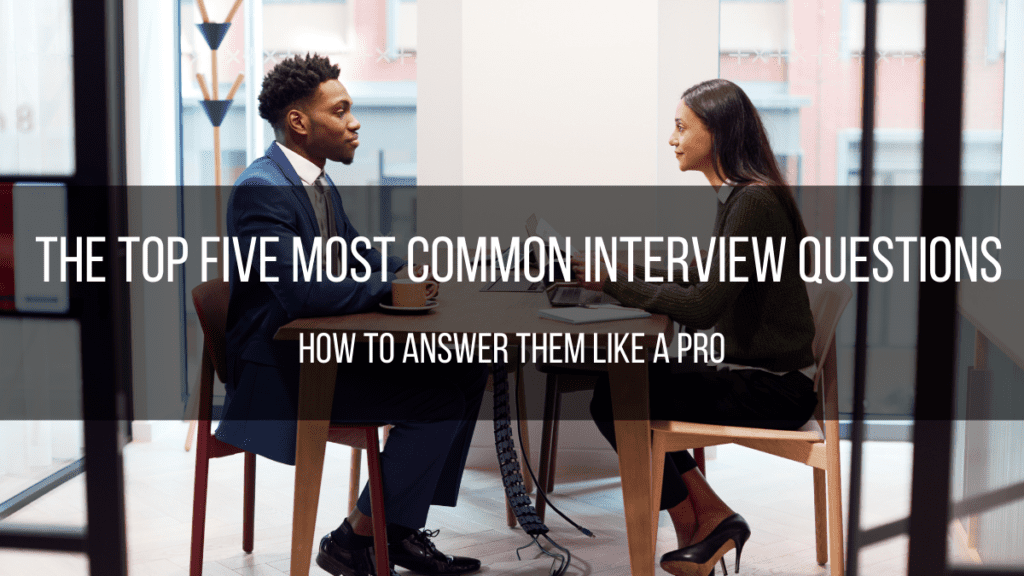
Job interviews can be daunting, but they don’t need to be with the proper preparation, and some insight into the interview questions you might be asked. The team at Elite have sat on both sides of the interview table, so we’re well equipped to help you navigate the job interview process and set you up for success.
Focus on your most recent and revant experience, highlight areas where you will add value in this role and reference specific skills that you have developed along the way that the interviewer is seeking.
Example: ‘Over the last ten years, I’ve built a career in the automotive sales industry. My most recent role is as the Sales Manager at Ford where I’ve led a team of eight to grow our sales division and achieve record sales of $3,000,000 this financial year. During my time at Ford I’ve really focused on developing my leadership and management abilities, and I’m looking forward to using these skillsets to help [interviewing company] reach its sales targets for the year.’
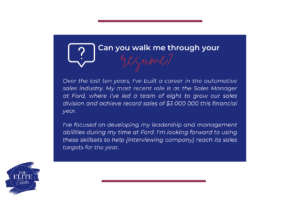
The key to nailing this question is to relate what you have to give, rather than what you want. You should demonstrate the value you can offer and how it aligns with what the company is seeking. Talk about how the role interests you, but always remember they want to know how you can help them, not just what’s in it for you
Example: ‘I have a passion and expertise in [insert skill] that’s grown stronger throughout my career, so finding a position where I can use this has been a priority throughout my job search. I can see from my research that [company name] wants to achieve [insert organisational goal], and I’d love to apply my skills to help meet that target.’
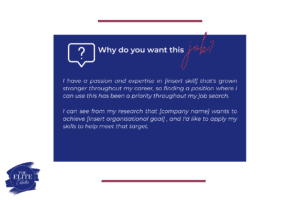
When asked this question in a job interview, you might mention the skills you would like to develop, the type of role that you see yourself in, and what you hope to have accomplished.
Feel free to show some ambition here, but hold back from telling the interviewer that you’re gunning to rise through the ranks and take their job. The interviewer wants to know if you’re just looking for a placeholder before you jump to the next rung on the ladder, or do you see yourself building a long term career with the company?
Example: ‘I see myself developing into a leader in the [industry] space. I hope that in five years, I’m continuing to deepen my [skills] and learning more about how to become an expert in [skill] so that I can ultimately [insert goal that aligns with the organisation].’
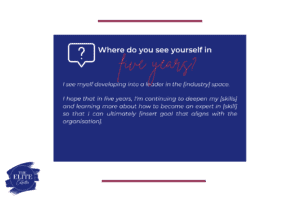
Your answer to this role should be honest and reflective of your motivations, but keep it positive. Now is not the time to divulge that you left under challenging circumstances. Stick to the facts, and don’t overshare. Focus your answer on the future rather than the past.
Example: ‘I’m seeking an opportunity to engage with clients face to face and build long-term relationships with them to meet their evolving financial needs. My current role focuses on online banking, so there is minimal opportunity to develop a connection with clients. Relationship building is one of my key strengths, so working with [company] excites me as I know that personal customer service is a priority here.‘
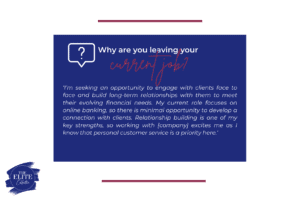
Many people still find discussing salary awkward, but it needn’t be. You know your worth, and the company knows what they have budgeted for the role. The key here is research, research, research. If you provide an answer to this question that is excessively lower or higher than the market value of the role, you may give the impression that you don’t know your worth. Research the typical salary for the role using the Seek Salary Guide tool, and tend toward the higher side of the stated range. Let your interviewer know if you have a degree of flexibility with your salary or if compensation is not the driving factor in your job search.
Example: ‘My salary expectation is between $XX,XXX and $XX,XXX, which my research shows is the average salary for a candidate with my experience level in this city. However, I have a degree of flexibility on this, as compensation is just one factor I will consider when accepting an offer.’
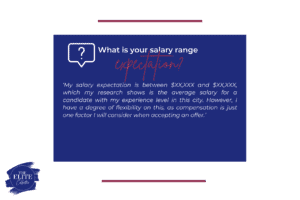
I know – I promised the top five questions, but this question still causes a lot of anxiety for people so I’m sneaking it in. While it’s a less common question these days, let me put your mind at ease.
So, what’s the best way to tackle this one?
When discussing your strengths, align them to the prospective role and refer to technical and soft skills. For weaknesses, stick to a skill that isn’t essential to succeed in the role and demonstrate your self-awareness and commitment to continuous improvement.
Example: ‘My strengths lie in my [insert soft skill] and my ability to [insert technical skill]. As the [insert role], I’m looking forward to using my expertise in this area to help [company] achieve [deliverable from role description].
[Insert skill] has traditionally been a weakness of mine. I recognised this early on in my career and have been committed to taking action to improve my abilities in this area by [insert improvement action].’
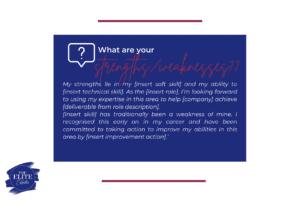
Another common question that makes a candidate squirm is the classic ‘Tell me about yourself’. Need some help on that one? Adriana, Founder of the Elite Collective, has got you covered in her blog here.
In addition to practising how you might answer common interview questions, doing some mental preparation and getting yourself in the right headspace is a perfect next step. You can find some great tips on mentally preparing for an interview here.
You can also jump in and catch the replay of our recent, free webinar on building a stronger, more positive mindset to take into your interview by clicking here.
An interview is every bit your opportunity to decide if the organisation is a good fit for you as it is for them to assess your fit. Often people will put a lot of thought and consideration into how they will answer questions, and then at the interview, ask the first questions that pops into their mind. Our tip? Put as much preparation into deciding what questions you will ask as you do the questions you expect to get asked.
The opportunity to ask questions will usually arise at the end of an interview, and it’s your chance to leave a lasting positive impact on the interviewer. The goal? Ask questions that demonstrate your genuine interest in the role and the organisation, not a filler question where you could quickly locate the answers on their website.
Some of our favourites to ask are:
A little more personal than asking about the broader company culture, this question will allow you to gain insight into both the organisational culture and the interviewer themselves.
This provides an opportunity to position yourself as a candidate that focuses not just on day-to-day business but plans for future success as well.
This question demonstrates that you’re already considering what you need to do to succeed in the role and positions you as a high-achiever.
Asking this question confirms to the interviewer that you’re confident, enthusiastic and eager to secure the role.
At The Elite Collective, nothing makes us feel more fulfilled than hearing that one of our clients has secured an interview for their dream job. We enjoy working with people at all stages of their careers and across every Australian industry. There’s a range of ways that we can support you:
I hope you enjoyed The Five Most Common Interview Questions and How to Answer Them Like a Pro and feel confident and prepared to ace your next interview! If you’ve found this blog useful, we’d love for you to share it with your social networks.
Our team of professional resume writers are located across Australia, specifically in Canberra, Melbourne and Sydney. We have clients throughout Australia who rave about our professional resume writing services, job application support and interview coaching. Get in touch with us today, and make your next career move with the support of a team of professionals.
We respectfully acknowledge the traditional custodians of the land upon which we live and work, the Ngunnawal people.
We acknowledge and respect their continuing culture and the contribution they make to the life of this city and this region, and extend that same respect to all Aboriginal and Torres Strait Islander people.
1 comment